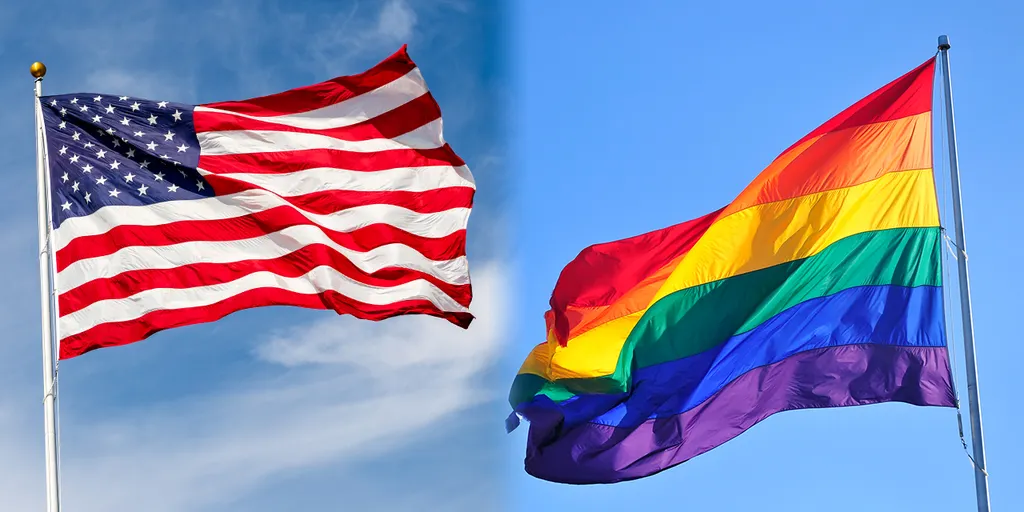In a highly controversial move, Kristin Pitzen, a teacher in Orange County’s Newport Mesa School District, removed the American flag from her classroom, encouraging students to pledge allegiance to the Pride flag instead. This event stirred significant public outrage, highlighting a national debate around respect for the American flag, free speech rights, and the role of educators in classrooms. In this article, we’ll dive into the details of this incident, the reactions from parents and community members, and the broader implications on education and patriotism.
Teacher’s TikTok Controversy: The Flag Removal and Student Pledge

Kristin Pitzen initially shared her actions through a now-deleted TikTok video, where she explained that the American flag made her feel “uncomfortable.” According to Pitzen, she had packed it away and “couldn’t find it.” In a lighthearted tone, she shared that during the Pledge of Allegiance, her students would typically stand but not recite the words. Lacking a U.S. flag in her classroom, one student inquired about what he should look at during the pledge. That’s when Pitzen pointed him toward the Pride flag hanging on her wall.
Pitzen’s video, which many found disrespectful to the American flag, quickly went viral, sparking a wave of backlash from parents, veterans, and members of the broader community who felt her actions disrespected national values. Critics argue that her behavior undermined the tradition and meaning of the Pledge of Allegiance.
The Pledge of Allegiance: A Symbol of National Patriotism
The Pledge of Allegiance has long been a hallmark of American classrooms, representing loyalty to the country and respect for the values of freedom and unity. When students recite the pledge, they honor the sacrifices of military personnel and celebrate American ideals. Pitzen’s removal of the flag and subsequent encouragement to pledge to the Pride flag struck a nerve with parents who believe that the American flag holds a unique place in the nation’s identity.
For many parents, this incident crossed a line. One mother expressed her anger by stating, “We just heard the school was short some flags, so we decided we’d help them out to show our patriotism.” In response, parents placed American flags across the school’s lawn, showcasing their support for the flag’s role in the classroom.
Pushing Pride: Support for the LGBTQ Community in Classrooms
In addition to her statements on the American flag, Pitzen displayed her support for the LGBTQ+ community by decorating her classroom with Pride-themed décor. In another now-removed TikTok video, she shared messages of support, saying, “I love you all very much – for the people who are out, who aren’t out. You’re appreciated. You’re loved. You’re enough. I support you. I got you.”
While many applaud inclusivity in education, others believe that promoting one particular symbol or ideology over another can alienate students and families with differing viewpoints. For some, Pitzen’s support for Pride felt like favoritism toward a specific cause rather than a celebration of diverse perspectives within the classroom.
Community Outrage and School Board Response
The video’s release ignited a storm of anger among parents, veterans, and other citizens. They argued that replacing the American flag with another symbol in the classroom went beyond support for diversity and became an act of disrespect. Michele Vaughn, a mother whose son serves in the military, voiced her frustration, saying she would “like to share with [Pitzen] if she doesn’t know the importance of respecting the flag.”
The Newport Mesa School District quickly became aware of the controversy and issued a statement emphasizing their commitment to national values. Pitzen was removed from her teaching role, and an ongoing investigation was launched to review her actions and determine further steps.
The Importance of the American Flag as a National Symbol

For many Americans, the flag represents freedom, unity, and the sacrifices made by generations of military members to protect these ideals. Critics argue that Pitzen’s actions dismissed this symbolism, sending a message to students that the flag and, by extension, the values it represents, are not essential.
One concerned citizen said, “The flag represents the freedom she enjoys today and is a living representation of that freedom. I don’t think she really gets it – she should be teaching students that it’s for the people who gave her the freedom and happiness she has now.” Another echoed these sentiments, stating that it was vital to remember the people who “fought to keep freedom” and to “never insult the flag which stands for our country.”
Free Speech, Inclusivity, and the Role of Educators
This incident raises complex questions about free speech and inclusivity in schools. While teachers have a duty to create inclusive learning environments, they are also representatives of the community’s values. The challenge lies in balancing the promotion of diversity with respect for national symbols and traditions.
In a world where students come from increasingly diverse backgrounds, inclusivity is essential. However, critics argue that respect for national symbols, like the flag, should not be compromised in the name of inclusivity. As educators navigate these sensitive areas, they must consider the impact of their actions on students and the wider community.
Aftermath and Broader Implications for Education and Patriotism

As of now, Pitzen is no longer teaching in the Newport Mesa School District, and her social media profiles have been erased. The incident remains a point of heated debate on social media, with some defending her as an advocate for LGBTQ+ rights and others seeing her as disrespectful toward American traditions.
For educators, this incident serves as a reminder of their responsibilities in shaping young minds. The removal of the American flag from Pitzen’s classroom underscores the importance of balancing personal beliefs with professional responsibilities. By fostering respect for diverse viewpoints while also honoring shared national symbols, teachers can create classrooms that are both inclusive and respectful of the values cherished by their communities.
Conclusion: Navigating Patriotism and Diversity in Education
The case of Kristin Pitzen brings to light the ongoing tension between promoting inclusivity and respecting national traditions. The American flag, as a symbol of unity and sacrifice, holds a unique place in the hearts of many, and its removal from a classroom can evoke strong emotions. While inclusivity is crucial, this incident underscores the need for educators to tread carefully, balancing personal beliefs with respect for national values.
As the education landscape evolves, finding this balance will be essential. Teachers play a vital role in shaping how students view the world, and actions in the classroom can have far-reaching implications. By fostering an environment of respect for all, including both the American flag and symbols of diversity, educators can build a foundation for an inclusive, united future.


